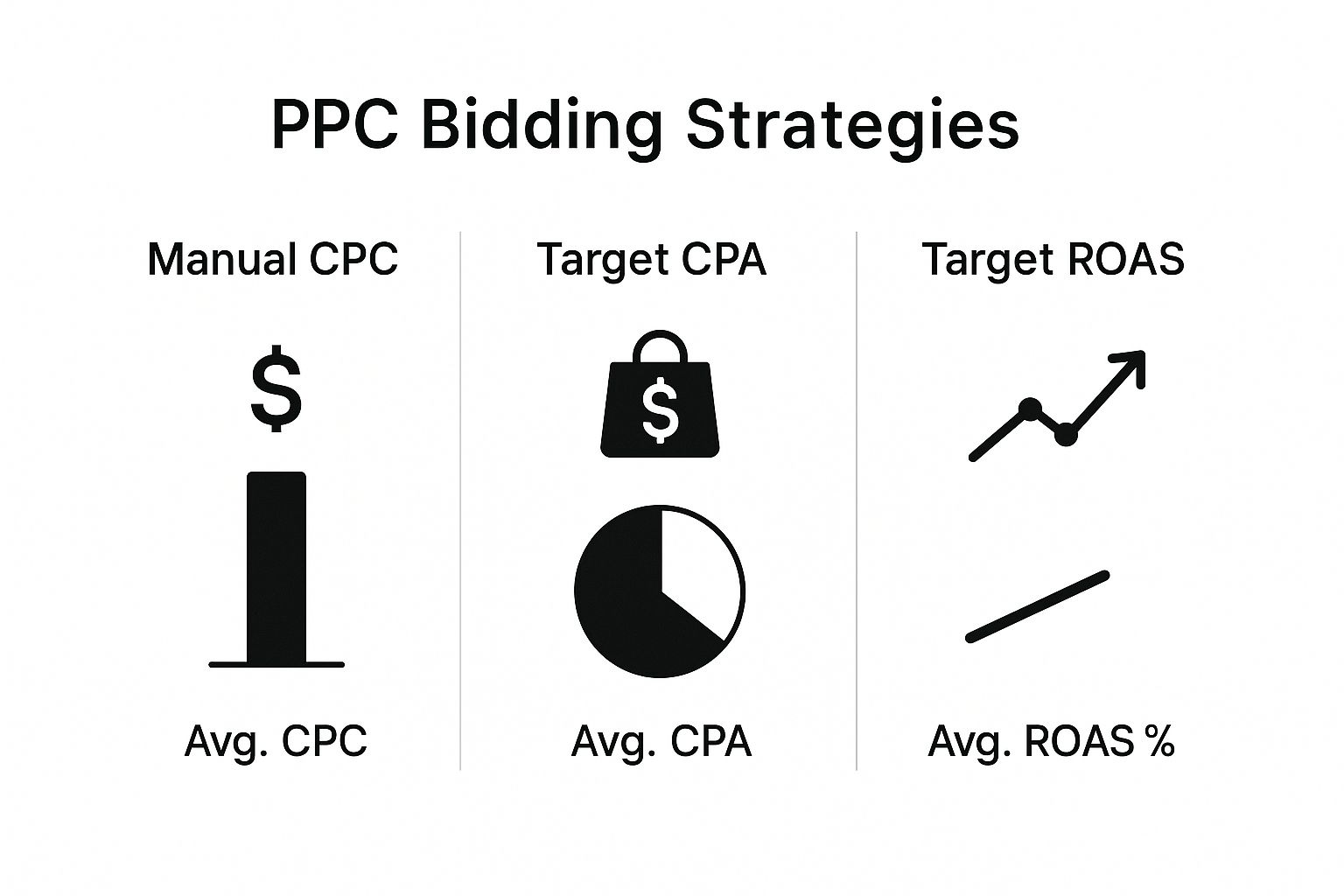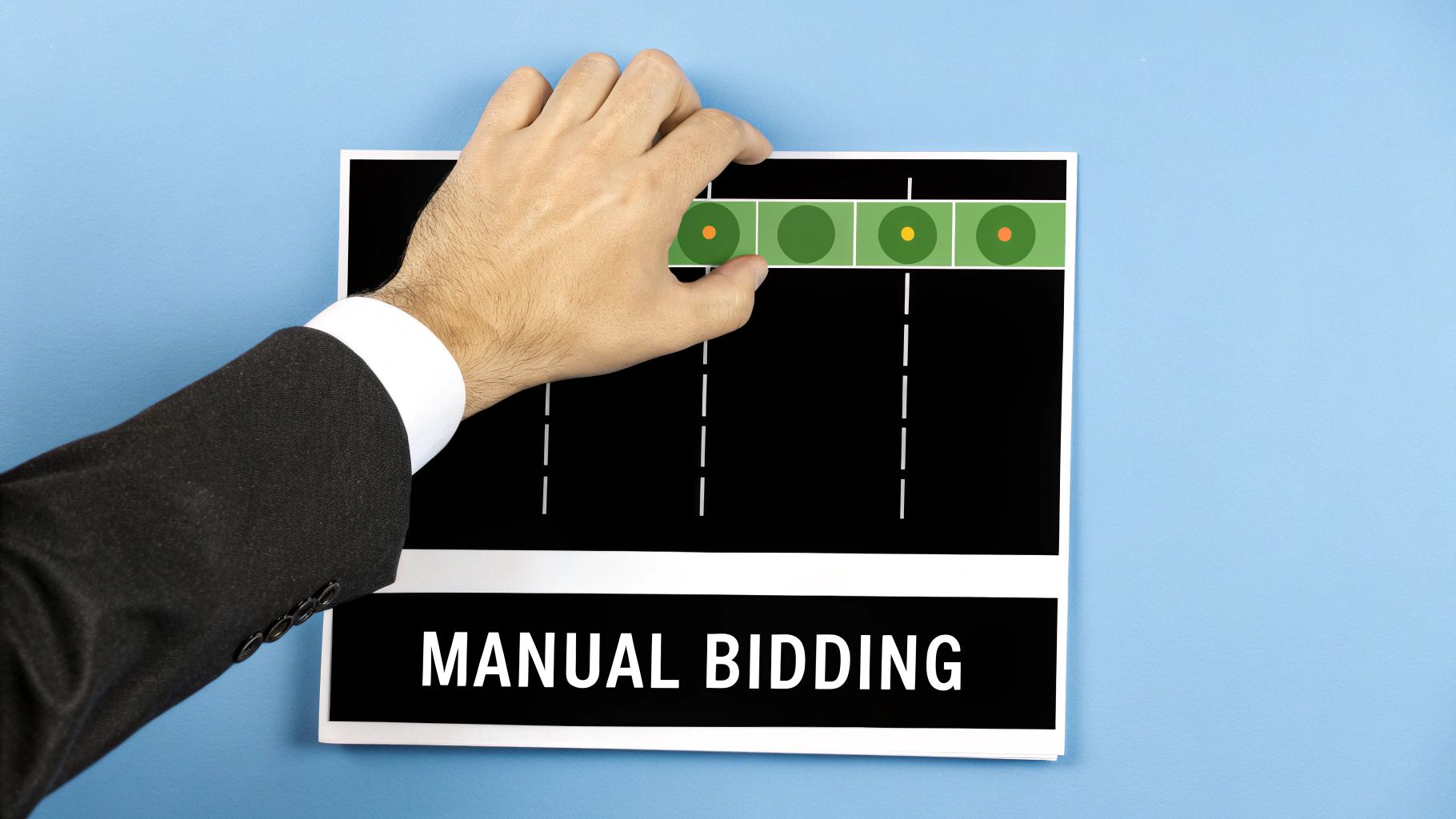A Guide to Modern PPC Bidding Strategies

Right, let’s talk about PPC bidding strategies. At its heart, a bidding strategy is simply the set of rules you give an ad platform to spend your budget.
Think of it this way: your budget is the fuel for your race car, and your bidding strategy is the driver. The driver makes all the moment-to-moment decisions to win the race. A smart strategy is what separates simply paying for clicks from strategically investing in business growth. It’s a crucial distinction.
So, What Are PPC Bidding Strategies Anyway?
Essentially, a PPC bidding strategy is your instruction manual for platforms like Google Ads. It tells the system how much you’re prepared to pay each time a potential customer interacts with your ad—usually by clicking on it. This all happens inside a real-time, automated auction that runs every single time someone hits ‘search’.
Your bid is a massive factor in your ad’s visibility, where it gets placed on the page, and what you end up paying per click (your CPC). It’s not just about who bids the highest, though. The auction also weighs up the quality and relevance of your ads. But make no mistake, your bid is a critical signal of your intent.
The Ad Auction in Action
Imagine you and three of your competitors all sell “eco-friendly dog beds”. When someone searches for that exact phrase, Google instantly kicks off an auction to decide which ads to show and in what order. Your bidding strategy is what determines your offer in this lightning-fast negotiation.
If your strategy is all about getting as many website visitors as possible (Maximise Clicks), the system might get aggressive with your bids to win that click. On the other hand, if your goal is to get new customers at a specific cost (Target CPA), it will only place a bid when it’s highly confident that click will lead to a sale.
This is the key concept to get your head around: you aren’t just setting a price. You’re choosing a goal, and the platform adjusts your bids automatically to try and hit it for you.
You’ll set up and monitor all of this from your Google Ads dashboard.
This is where you turn your business objectives into clear, actionable instructions for Google’s algorithm to follow.
Why This Really Matters for UK Businesses
The UK market is incredibly competitive, which makes having a well-thought-out bidding strategy absolutely essential. A 2023 study revealed that the UK had the highest average CPC in Europe, sitting at around £1.00. That number alone shows just how quickly your costs can spiral without a solid plan. If you want to dig deeper, you can explore the details on European PPC costs to see how the market stacks up.
Without the right approach, you’re just throwing money away on clicks that don’t lead to sales or enquiries. A carefully chosen strategy makes sure your investment is laser-focused on achieving real, measurable business outcomes, turning your ad spend into tangible returns.
PPC Bidding Strategies: Manual vs Automated Bidding – Which Is Right for You?
Deciding between manual and automated PPC bidding is a bit like choosing to drive a manual or an automatic car. One gives you that raw, hands-on control over every gear change, perfect for when you need to navigate tricky roads with real precision. The other takes care of all the complex mechanics for you, letting you focus on the bigger picture – getting to your destination.
The real difference boils down to who’s making the bidding decisions. With manual bidding, you’re in the driver’s seat, setting the maximum cost-per-click (CPC) for your ad groups or keywords yourself. It’s a powerful approach if you’re running a small, tightly-focused campaign and have the time to keep a close eye on performance.
But let’s be realistic. Manually managing hundreds, or even thousands, of keywords is a monumental task. That’s where automated bidding comes in, using machine learning to do all the heavy lifting.
The Rise of Automated Intelligence
Instead of you meticulously setting every bid, automated strategies adjust them for you in real-time, all based on the campaign goals you’ve set. You don’t tell the ad platform what to bid; you tell it what you want to achieve – more conversions, a specific cost per acquisition (CPA), or a target return on ad spend (ROAS).
This shift to automation is a huge deal. Here in the UK digital ad world, AI has become a core part of the toolkit. In the retail sector alone, machine learning algorithms now handle up to 65% of bid adjustments and audience targeting. It’s a clear move away from old-school manual tweaks and towards smarter, data-driven strategies that are always learning and optimising.
The chart below gives you a feel for how different bidding strategies stack up against key metrics, helping you see the trade-offs at a glance.
As you can see, each strategy is built to optimise for a different result, whether that’s keeping a tight rein on click costs or pushing for the highest possible return on your investment.
To help you decide which approach fits your business needs, here’s a direct comparison of Manual and Automated bidding.
Manual vs Automated Bidding At a Glance (PPC Bidding Strategies)
| Feature | Manual Bidding | Automated Bidding |
|---|---|---|
| Control | Granular, hands-on control over every bid. | You set the goal, Google’s AI controls the bids. |
| Effort | High. Requires constant monitoring and adjustment. | Low. Frees up your time for strategy and creative. |
| Best For | New campaigns, small budgets, gaining insights. | Established campaigns with conversion data, scaling growth. |
| Data Needs | Minimal. You can start without any historical data. | Needs a good amount of conversion data to work effectively. |
| Speed | Slow to react across large numbers of keywords. | Real-time adjustments based on thousands of signals. |
| Goal Focus | Primarily focused on controlling click costs (CPC). | Optimises for business outcomes like ROAS or CPA. |
This table should give you a clearer picture, but remember, the “best” choice really depends on your specific situation and goals.
When to Stick with Manual Bidding
Even with all the power of automation, manual bidding absolutely still has its place. In fact, it’s often the smartest choice in a few specific situations:
- Brand New Campaigns with No Data: When you’re launching a campaign from scratch, you have zero historical conversion data for the automated systems to work with. Manual CPC is perfect for gathering that initial data and getting a feel for what works.
- When You Need Maximum Control: If you need to react to market changes in a split second or want to guarantee your ads hold a specific position for strategic reasons, nothing beats the immediate control of manual bidding.
- For Very Small Budgets: On a really tight budget? Manual bidding helps you squeeze every last drop of value out of your ad spend by letting you focus only on your most critical, high-performing keywords.
By directly controlling bids, you can protect your budget and gather crucial initial performance data, which is essential for any successful pay-per-click campaign.
Ultimately, the choice isn’t always a simple “one or the other” decision. Many of us in the industry start new accounts with manual bidding to get our bearings and collect that vital initial data. Once we’ve built up enough conversion history, we then transition to an automated strategy to scale things up. This hybrid approach often gives you the best of both worlds: initial control followed by data-driven optimisation that can really grow your business.
PPC Bidding Strategies: How Smart Bidding Drives Your Business Goals
While manual bidding gives you that hands-on, granular control, Smart Bidding is where you really start to work with Google’s AI. It’s like handing the keys to a co-pilot whose only job is to hit your specific business goals. This is a huge leap from simply automating bids; it’s about tying your PPC spend directly to real-world results like leads, sales, or customer sign-ups.
Think of it like briefing an expert on your team. You don’t tell them exactly how to do their job, step-by-step. Instead, you tell them what you need to achieve, and you trust them to use their expertise to make it happen. Smart Bidding works the same way, using machine learning to analyse thousands of signals in real-time to set the perfect bid for every single auction.
Before you dive in, a word of caution: these strategies live and die by data. You absolutely must have your conversion tracking set up flawlessly. The AI needs accurate feedback to learn what’s working and what isn’t.
Target CPA for Predictable Lead Costs
Target Cost Per Acquisition (CPA) has one clear objective: get you as many conversions as possible at, or below, a specific cost you set. This makes it the go-to choice for businesses focused on lead generation, like service providers or B2B companies, where every new lead has a known value.
You simply tell Google, “I’m willing to pay £50 for every new customer who signs up.” The algorithm then gets to work, bidding more aggressively on clicks it predicts will convert and pulling back on those that won’t, all while trying to maintain that £50 average.
Target ROAS for E-commerce Profitability (PPC Bidding Strategies)
For an e-commerce brand, not all sales are created equal. A £20 order is a world away from a £200 one. This is exactly where Target Return On Ad Spend (ROAS) comes into its own. Instead of setting a cost per action, you set a revenue target for every pound you spend on ads.
Example: You set a Target ROAS of 500%. This tells Google you want to generate £5 in revenue for every £1 you spend. The algorithm will then hunt for users who aren’t just likely to buy, but who are also likely to make bigger purchases.
This strategy links your ad spend directly to your bottom line, making it an incredibly powerful tool for maximising pure profitability.
Maximising Your Conversions and Value
What if you don’t have a specific CPA or ROAS target just yet? Or maybe your main aim is to squeeze every last drop of performance out of your daily budget. That’s where the “Maximise” strategies step in.
- Maximise Conversions: This strategy works to get you the highest possible number of conversions within your budget. It’s a fantastic option for new campaigns where you need to gather data quickly, or for any business that simply wants to maximise lead volume without a strict cost constraint.
- Maximise Conversion Value: This is similar, but instead of chasing the number of conversions, it focuses on the total revenue generated. The system will actively pursue high-value sales, even if it means getting fewer individual transactions, to ensure your budget delivers the biggest financial punch.
These automated approaches are a major step forward in PPC management. If you want to get into the nuts and bolts of how it all works, our guide to Google Ads Smart Bidding goes into much more detail. Choosing the right one is all about knowing what you want to achieve, whether that’s predictable costs, maximum profit, or just sheer volume.
PPC Bidding Strategies: Exploring Advanced AI-Powered Bidding Frontiers
Right, once you’ve got your head around the core Smart Bidding strategies, it’s time to look at what’s next. The real cutting edge of PPC bidding is shifting away from simple conversion goals. It’s starting to use AI to predict and act on something far more powerful: long-term business value.
This is where you can build a genuine, lasting competitive advantage that your rivals will struggle to copy.
Instead of just chasing a single sale, these advanced approaches look at the entire customer journey. They start asking bigger, more strategic questions. Which customers are likely to come back? Who’s going to have the highest lifetime value? This moves the focus from quick, short-term wins to building sustainable, long-term growth.
This is where AI truly flexes its muscles, crunching complex data sets to make predictions that a human manager simply couldn’t.
The Shift to Value-Based Bidding
The most important evolution happening right now is Value-Based Bidding. Think of it as the next logical step up from Target ROAS. Instead of just optimising for the value of the first transaction, it’s all about acquiring customers who will be more valuable to your business over their entire lifetime.
This means you have to feed the AI much smarter data. You need to provide information on what types of customers make repeat purchases, who has lower return rates, or which ones upgrade to your premium services. The algorithm then learns to spot the signals of these high-value individuals and bids more aggressively for them—even if their first purchase is a small one.
The goal is no longer just about getting the sale; it’s about acquiring the right customer. It’s a profound shift from a transactional mindset to one focused on building a valuable customer base.
This approach lines up your ad spend directly with your most important business objectives, ensuring every pound spent is an investment in future profit.
Leveraging Real-Time Contextual Signals (PPC Bidding Strategies)
Another advanced area is the use of real-time contextual signals. Modern AI algorithms don’t just look at keywords anymore; they analyse a huge array of signals at the very moment of the auction to get a read on a user’s immediate intent.
These signals can include:
- Time of day and location: Is the user searching for “cafes near me” during their morning commute? That’s a strong signal.
- Device type: A search on a mobile device often signals more immediate intent than one on a desktop computer.
- Remarketing list membership: Has this person visited your site before? Even better, have they abandoned a basket?
- Browser and operating system: These can sometimes give clues about user demographics or how tech-savvy they are.
By processing all these signals in an instant, the AI can adjust bids with incredible precision. It can bid higher for a user showing all the signs of being ready to buy, and pull back for someone who seems to be in the early research phase. This dynamic adjustment ensures you’re paying the right price for every single click.
The world of PPC bidding in the UK is being profoundly shaped by these advances. A key strategy emerging is probabilistic value-based bidding, which ditches traditional CPA targets in favour of maximising predicted customer lifetime value. UK advertisers are deploying machine learning models to estimate future revenue from different user segments, adjusting bids to capture these high-value prospects.
How to Select the Right Bidding Strategy
Choosing the right PPC bidding strategy isn’t about finding a single “best” option that works for everyone. It’s about picking the right tool for the job you need doing. This shouldn’t feel like a shot in the dark. By asking yourself a few key questions, you can build a clear framework for making the right call and set your campaigns up for success from day one.
The first and most important question is a simple one: What is your primary business goal? Your answer will instantly slice the list of options in half. Are you trying to get as many leads as possible for your service business, or are you an e-commerce brand obsessed with profitability?
- For awareness or traffic: If your main aim is to make a splash and get your brand name out there, a strategy like Maximise Clicks is a brilliant place to start. It does exactly what it says on the tin, focusing purely on driving the highest number of visitors to your site within your budget.
- For leads or sales: When you’re chasing a specific action – a form fill, a phone call, or an actual sale – your focus has to be on conversions. This is where strategies like Target CPA or Maximise Conversions come into their own, telling the algorithm to hunt for users who are most likely to take that valuable step.
- For profitability: If you’re running an e-commerce store with products at all different price points, profit is king. Target ROAS is built for this very scenario. It optimises for revenue, not just the number of sales, making sure you get the best possible return on every pound you spend.
Assess Your Data and Resources (PPC Bidding Strategies)
Next up, you need to be honest about how much historical data you have. Automated bidding strategies are smart, but they aren’t mind-readers; they need data to learn and get better. Think of it like a new employee – they need a bit of time and information to understand their role before they can really start smashing it.
A brand-new account with zero conversion history is like a blank slate. Throwing a data-hungry strategy like Target ROAS at it from the get-go is a recipe for disaster. The algorithm has nothing to learn from, so it will just flail around.
In these situations, starting with Manual CPC or Maximise Clicks is often the wisest move. This approach lets you gather that crucial initial data. You’ll want to aim for at least 15-30 conversions over a 30-day period as a solid benchmark. Once you have that, you can confidently switch to a more advanced, conversion-focused strategy. This patient, data-gathering phase is a core part of learning how to optimise PPC campaigns for long-term growth.
Match the Strategy to Your Business Type
Finally, think about your business model. The perfect PPC bidding strategy for a local plumber is completely different to what a national online retailer needs.
A local service business might see fantastic results with Target CPA, aiming for a predictable and reliable cost per lead. On the other hand, a huge e-commerce store with thousands of products will almost certainly rely on Target ROAS to manage profitability across its entire catalogue.
Getting this choice right ensures your ad spend is working in perfect harmony with your core business objectives, turning your clicks into real, measurable results.
Your Top PPC Bidding Questions, Answered
When you’re deep in the weeds of managing a PPC account, a few common questions always seem to pop up about bidding. Let’s be honest, getting these wrong can be the difference between a campaign that sings and one that just… sinks. We’re going to tackle the big ones head-on, so you can make smarter decisions with more confidence.
First up, the question of time. You’ve just launched a new bidding strategy. How long do you actually have to wait before you can tell if it’s working or if you need to pull the plug? The temptation to tweak things after a day or two is real, but you have to resist.
Give any new automated bidding strategy at least 2-4 weeks to run. This isn’t just about being patient; it’s about letting Google’s machine learning complete its “learning phase.” It needs this window to hoover up enough data to start making genuinely smart, effective optimisations. If you jump the gun and change things too early, you reset the whole process, and you’ll never see what it was truly capable of.
This learning period is a non-negotiable part of good campaign management. For a much deeper look into how these timelines work and why they matter, our guide to PPC campaign management for UK businesses is a great next read.
Can I Use Automated Bidding with a Small Budget?
Absolutely, you can. It’s a complete myth that automated bidding is a tool reserved only for the big spenders. You just need to be clever about it.
Some strategies, like Maximise Clicks, are practically built for smaller budgets. Their entire purpose is to wring as much traffic as possible out of every pound you spend. But when you start looking at the more advanced, data-hungry strategies, there’s a catch:
- Target CPA and Target ROAS are brilliant, but they need a steady diet of conversion data to do their job properly.
- If your budget is so tight that you’re struggling to get at least 15-30 conversions a month, these strategies will likely struggle to find their groove and perform optimally.
If you’re working with a smaller budget, the best play is usually to start with a less demanding strategy. Focus on building up that conversion history first. Once you have a solid foundation of data, you can then “graduate” to the more sophisticated approaches.
What Is the Biggest Bidding Mistake to Avoid?
Without a doubt, the single biggest mistake we see advertisers make is treating automated bidding like a “set it and forget it” magic button. These systems are incredibly powerful, but they aren’t mind readers. They are only as good as the instructions and data you feed them.
A classic blunder is setting up a Target CPA or Target ROAS campaign and then walking away, never to adjust the targets again. The market is constantly changing—your competitors are making moves, customer behaviour shifts, and your own performance will evolve. If you fail to regularly review your targets against what’s happening in the real world, you’re guaranteed to either waste money or leave a huge amount of opportunity on the table.
Always remember: you guide the machine. It doesn’t guide itself.
Ready to stop guessing and start getting real results from your advertising spend? The team of experts at PPC Geeks can help. We create and manage data-driven campaigns that align with your specific business goals, ensuring every pound is put to work effectively. Learn more and get your free PPC audit today.
Author
Search Blog
Free PPC Audit
Subscribe to our Newsletter
The Voices of Our Success: Your Words, Our Pride
Don't just take our word for it. With over 100+ five-star reviews, we let our work-and our satisfied clients-speak for us.
"We have been working with PPC Geeks for around 6 months and have found Mark and the team to be very impressive. Having worked with a few companies in this and similar sectors, I rate PPC Geeks as the strongest I have come across. They have taken time to understand our business, our market and competitors and supported us to devise a strategy to generate business. I value the expertise Mark and his team provide and trust them to make the best recommendations for the long-term."
~ Just Go, Alasdair Anderson




